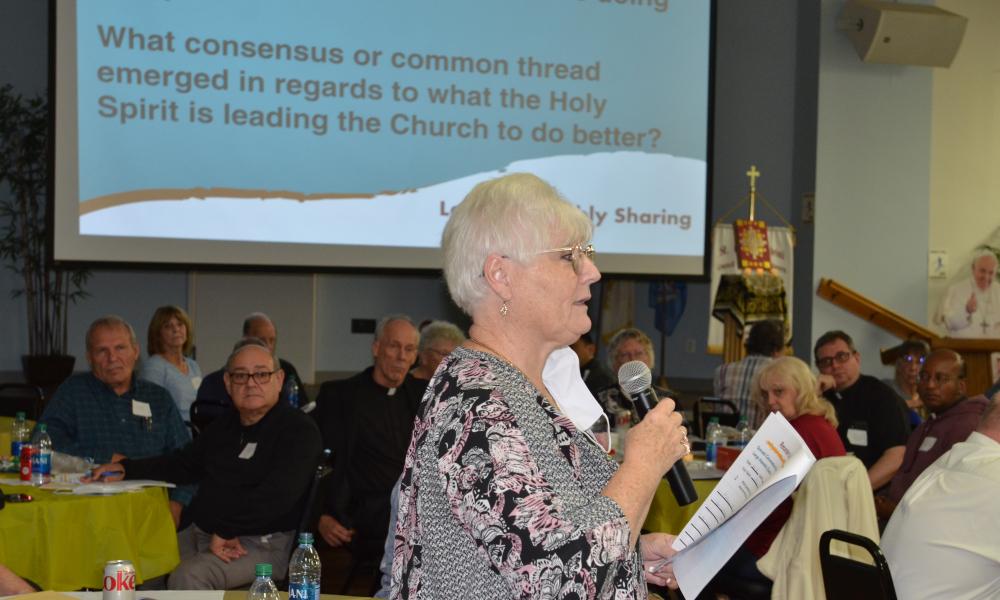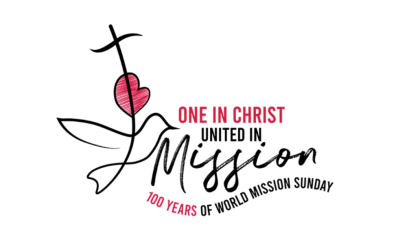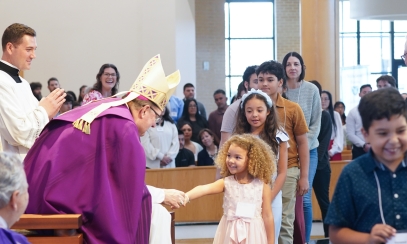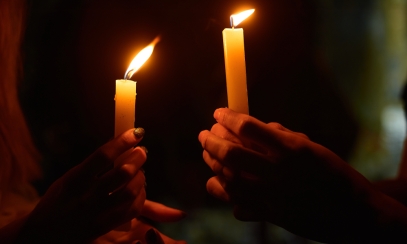
Clergy, Religious and Local Leaders Begin the Process of “Walking Together” for Vatican Synod
More than 350 parish and school leaders gathered together November 8-10, 2021 for “Synod Sessions” to experience firsthand what the Holy Father is asking of the Catholic Church globally. Pope Francis has called for a Synod on the topic of synodality. The word synod comes from two Greek words that means “walking together.” Generally, it refers to a habit of mutual listening, dialogue, and collective discernment. Local experts on synodality provided insights and training materials to empower leaders to host their own “Synod Session” to align with the pope’s vision.
Father Joshua Bertrand, who graduated from the Pontifical Gregorian University in Rome, explained that synodality is rooted in Scripture.
“Two aspects of a synod are shown in the Sacred Scripture of the Church: in togetherness and in the equality early Christians gave each other. Even though they had different roles, there was an equality given to each and every one of them,” said Father Joshua, Parochial Vicar of St. Ignatius of Antioch Parish in Tarpon Springs.
Father Ralph D’Elia, Parochial Vicar of the Cathedral of St. Jude the Apostle in St. Petersburg, emphasized that the Synod is not about developing new programs or changing Church doctrine.
“It’s not about generating something new out of this process, but rather recognizing the newness of Christ in our lives and clinging to that,” said Father Ralph, who also graduated from the Pontifical Gregorian University.
Father Ralph also explained that the Synod is needed so the Church can better understand the context of the world today.
“For the Church to communicate to the world today, we have to understand our context, the challenges we face. We have to discern together, as a Church, how the Holy Spirit is at work. Together with our bishop, we can come together to look at how the Holy Spirit is drawing us into this mystery of Christ, how the Holy Spirit is doing something new in our midst,” added Father Ralph.
Ben Martin, a local expert on Church history, shared that synodality is an ancient practice in the Catholic Church.
“In the Acts of the Apostle, we see a new kind of gathering for prayer and discernment together in response to one of the first crises faced by the early Church, the first Synod or Council of Jerusalem. This occurred around the year 50 A.D.,” said Martin, a parishioner of St. Lawrence Catholic Church in Tampa.
Synodality requires a process of discernment to reflect on how the Holy Spirit is guiding each person and the Church. That’s why the “Synod Session” for parish leaders also included Lectio Divina, a contemplative way of praying with Scripture. During this prayer, participants reflected on questions that were provided by the Vatican’s Synod of Bishops. Participants also listened to one another as questions were answered during times of small group and large assembly sharing.
“Lectio Divina means holy reading. It begins with a quieting of ourselves and then a reading through a section of Scripture. During quiet times, you should ask yourself what is the Scripture saying to you, what are your thoughts and feelings. These are your reflections, your thoughts inspired by the Scripture,” said Sabrina Burton-Schultz, Director of the Office of Life, Justice and Advocacy.
In the Diocese of St. Petersburg, Bishop Gregory Parkes is asking parishes and schools to consider hosting a “Synod Session” starting this December and continuing through March of 2022. This will be an opportunity for the faithful to come together for learning, prayer, discernment, and faith sharing. At least nine “Synod Sessions” will be held in regions across the five counties of the Diocese. Dates and times are still being formulated and will be announced at www.JourneyingTogether.org.
Pope Francis and Bishop Gregory Parkes are also asking parishes and schools to consider reaching out to the peripheries, an area or a group that is disenfranchised or isolated from the parish community. The hope is to encounter individuals who feel marginalized or alone on their faith journey to learn about their experiences of faith and the Church.
“The Synod process will require that we have a willingness to encounter and engage others wherever they may be in their life and spiritual journey – understanding that everyone is at a different place,” said Bishop Parkes.
To be as inclusive as possible with the discernment process, parishes and schools are also asked to consider Synod Sessions with leaders from other Christian denominations and faith backgrounds.
To ensure that the large Hispanic community is included in the Synod process, a “Synod Session” with Spanish leaders will be held on December 4, 2021 at St. Patrick Parish in Tampa. The goal is to train leaders on the Synod process so they can reach out to the Spanish-language population for learning, prayer, discernment, and faith sharing. The three “Synod Sessions” for parish and school leaders already held were hosted by St. Frances Xavier Cabrini Parish in Spring Hill, St. Catherine of Siena Parish in Clearwater and Most Holy Redeemer Parish in Tampa.
The insights collected during these “Synod Sessions” will be reported to the Diocese of St. Petersburg Synod Team. The diocesan Synod Team will develop a 10-page report from all submissions for the bishop’s review. Bishop Parkes will then submit the diocesan report to the United States Conference of Catholic Bishops (USCCB).
A team from the USCCB will develop a country report (comprised of all the dioceses in the United States) for the Continental Phase of the Synod process. The Bishops’ Conferences of the USA and Canada will then develop a combined report for the Synod of Bishops for the development of their world-wide report.
“The seeds of the Holy Spirit that come from one voice in our local community will be joined with other voices throughout the world to assist the Church in discerning its calling from God into the third millennium,” said Dr. Lois Locey, who has been appointed by Bishop Parkes as the diocesan contact for the Synod on Synodality.
History of Synodality in the Diocese of St. Petersburg
Our Diocese has a history of journeying together through listening. After Bishop Parkes arrived in our Diocese, he called for nine listening sessions to hear from the faithful on various aspects of Church life. In 2018, a listening session was held in the Diocese of St. Petersburg to learn about experiences of racism in the Church.
Also, from 2016 to 2019, parishes participated in the V National Encuentro, a four-year process of ecclesial reflection and action that invited all Catholics in the United States to intense missionary activity, consultation, leadership development, and identification of best ministerial practices in the spirit of the New Evangelization. Missionary disciples were trained on how to joyfully reach out to others and accompany them in their daily life and faith. This missionary process is known as an encounter, which is Encuentro in Spanish.
What is a Synod?
The words "synod" and "synodality" have three main uses in the Church:
- "Synod" as used in phrases like "the Synod of Bishops" refers to a standing body of bishops who, for example, aid the Pope in listening to and guiding the Church.
- More often "synod" refers to an event, a gathering, most often of bishops, to discuss challenges that the Church faces and to discern together how to move forward.
- Finally, "synodality" refers to a style that characterizes the life of the entire Church, a habit of mutual listening, dialogue, and collective discernment. This style is most apparent during synods but ought to characterize the life of the Church in all times and at every level.
Photos from Parish Empowerment Synod Sessions November 8-10, 2021:
Most Holy Redeemer Parish: https://flic.kr/s/aHsmX8mM1X
St. Catherine of Siena Parish: https://flic.kr/s/aHsmX8mhYe
St. Frances Xavier Cabrini Parish: https://flic.kr/s/aHsmXc5YmZ
Update December 9, 2021: Photos from Spanish Parish Empowerment Synod Session December 4, 2021 at St. Patrick Parish, Tampa. https://www.flickr.com/photos/diostpete/albums/72157720221363751



